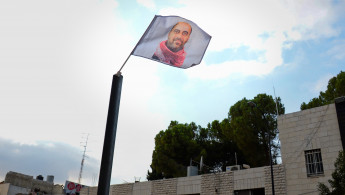Palestinian Authority temporarily frees security officers accused of killing Nizar Banat
Palestinian President Mahmoud Abbas has ordered the release of the security officers accused of killing activist Nizar Banat last year.
The 46-year-old dissident, an outspoken critic of the Palestinian Authority, died in custody last year after dozens of security forces stormed his home in Hebron to arrest him.
The 14 accused officers have been freed on the condition that they attend court hearings on time, a security source told The New Arab's Arabic-language service Al-Araby Al-Jadeed.
They will remain at liberty, so that they can get medical checkups, until 2 July, just a day before their next court hearing.
Banat's family slammed the decision to release them, saying they refuse to trust or cooperate with Palestinian Authority courts.
"The international judiciary is the only path that we as a family have to expose the nature of the Palestinian Authority, achieve justice for Nizar and hunt down authority officials and symbols wherever they are", they said in a statement read by Banat's brother, Ghassan Banat.
Banat was killed on June 24 last year.
His death was met with widespread outrage and angry protests in the occupied West Bank.
At the time of Banat's death, PA Justice Minister Muhammad Shalalda, who headed a committee investigating the killing, told official Palestine TV that Banat had been subject to physical violence and that his death was "unnatural".
He said that the committee confirmed "from footage and all reports" that the Banat had left his home alive but lost consciousness on the way to hospital.
Prior to his death, Banat spoke out against a deal between the PA and Israel to distribute 1 million Covid-19 doses to Palestinians in the West Bank, a deal which fell through after it transpired that the doses were due to expire at the end of June.
Banat's death was seen by observers as symbolising the PA's further descent into authoritarianism, coming after decades of abuse, torture and other rights violations deployed against critics of the semi-autonomous authority that was created following the Oslo Accords with Israel in 1993.





 Follow the Middle East's top stories in English at The New Arab on Google News
Follow the Middle East's top stories in English at The New Arab on Google News


